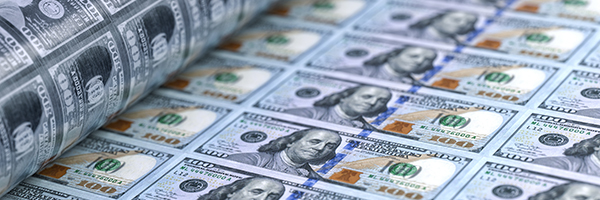Short Term

May 13, 2025 | Daily JAM, Morning Briefing, Short Term |
Consumer Price Index (CPI) inflation ticked up month to month in April from March. but the annual rate of inflation fell. The all-items CPI rose 0.2% in April. that reversed a slight decline in March. The annualized rate of inflation fell to 2.3%. The annual rate of headline inflation is the lowest since early 2021. Core inflation, which excludes food and energy, rose at an annual rate of 2.8%. That was the same annual rate as in March. The Federal Reserve watches core inflation, rather than all-items inflation.

April 23, 2025 | Daily JAM, Morning Briefing, Short Term |
Despite the rally on Tuesday and Wednesday, the S&P 500 Index is still down around 4% since April 2, the day President Donald Trump announced his tariff plans. Where do stocks go from here in the short term? Depends on the headlines on tariffs and the Federal Reserve, I’d say But the trend in volatility is clear. Stocks are swinging wildly day to day. Since April 2, the Standard & Poor’s 500 has posted five declines of more than 2% and two gains of more than 2% in just 14 sessions.

April 17, 2025 | Daily JAM, Morning Briefing, Short Term |
One day after Fed Chair Jerome Powell warned that the administration’s trade war was “highly likely” to spur a temporary rise in inflation with the potential for longer-lasting effects President Donald Trump blasted the Federal Reserve for not lowering interest rates and said its chair’s “termination cannot come fast enough.” “Jerome Powell of the Fed, who is always TOO LATE AND WRONG, yesterday issued a report which was another, and typical, complete ‘mess!’” Trump wrote on Truth Social. Referring to interest rates, he added: “He should certainly lower them now. Powell’s termination cannot come fast enough!”

April 14, 2025 | Daily JAM, Short Term |
Morgan Stanley (MS) and Citigroup (C) have cut their estimates for 2025 earnings with a warning that tariffs will curb profit growth.

April 11, 2025 | Daily JAM, Short Term, Videos |
Today’s Hot Money Move is Where’s the Systemic Risk This Time? I’m watching the banking sector for signs of a liquidity crunch-—specifically, the growing pile of “stranded loans” from private equity buyouts. Banks lent billions for these deals but now can’t offload the debt to investors, locking up capital that should be flowing elsewhere. If this logjam gets worse, the Fed could see it as systemic risk—-just like in 2008 or 2020-—and step in with a lifeline. The Play: Watch mid-tier banks (think PNC, not JPMorgan) when earnings drop in April. If they start warning about stuck loans, it’s a signal the Fed might move. That’s when liquidity fears could turn into a market-wide event. For now, it’s a waiting game—-but one worth tracking closely.

April 9, 2025 | Daily JAM, Short Term |
Just in case you were getting bored with the lack of volatility in today’s market: On Wednesday afternoon, President Donald Trump announced he would raise the tariff charged on Chinese exports to the United States to 125%, effective immediately. And that he would pause for 90 days most of the tariffs he announced just last Wednesday on Liberation Day and instead implement a 10% global tariff. Here’s what President Trump wrote on social media

April 9, 2025 | Daily JAM, Short Term |
Two and half hours before the opening of the U.S. stock markets Wednesday morning, China announced its response to President Donald Trump’s hike of tariffs on all Chinese imports. China imposed a 50% retaliatory tariff on all U.S. goods, bringing the total counter-tariff to 84%.

April 9, 2025 | Daily JAM, Morning Briefing, Short Term |
The yield on the 10-year U.S. Treasury is up 13 basis points to 4.43% as of noon New York time today as bond prices fell on strong selling. That’s extraordinary–usually Treasuries rise in price and yields fall when fear stalks Wall Street–and cause for worry. Just a few days ago, the 10-year Treasury had traded below 4%. Yields on the 30-year bond rose significantly today as well, at one point on Wednesday topping 5%.
“The global safe-haven status is in question,” Priya Misra, a portfolio manager at JPMorgan Asset Management, told Bloomberg.

April 3, 2025 | Daily JAM, Morning Briefing, Short Term, Volatility |
After weeks of trying to believe that President Donald Trump wasn’t serious about imposing massive tariffs on the rest of the world, Wall Street heard president Trump do exactly that from the Rose Garden yesterday. And today stocks opened down biggly. At 11:20 a.m. New York time, the Standard & Poor’s 500 was down 4.21%. The NASDAQ Composite and the NASDAQ 100 were lower by 5.24% and 4.64%, respectively. The small cap Russell 2000 had tumbled 4.63%. Shares of Apple (AAPL) were down 8.64%. Nike (NKE) was off 11.79%. Nvidia (NVDA) was lower by 6.66%. Why the huge drop?

March 30, 2025 | Daily JAM, FXY, Perfect Five-ETFs, Short Term, UUP |
On Monday, March 31, I will sell the Invesco DB U.S. Dollar Index BullishFund ETF (UUP) out of the Perfect 5 ETF Portfolio and replace it with the Invesco CurrencyShares Japanese Yen ETF (FXY). I will leave the portfolio weighting at 25%. The yen ETF is up 5.32% in the last three months as of the close on March 28. It charges a 0.40% expense ratio.

March 29, 2025 | Daily JAM, Short Term |
Wall Street is, clearly, afraid that President Donald Trump’s tariffs are going to significantly slow the U.S. economy. Those fears drove the Standard & Poor’s 500 down another 1.97% on Friday and sent the NASDAQ Composite down 2.70%. But I think that there’s still a large percentage of investors who think the tariffs won’t be as bad as their advance press suggests, either because they believe they’re simply negotiating ploys or because President Trump has history of barking worse than he bites. Frankly, I think those investors are wrong.

March 24, 2025 | BABA, Daily JAM, Jubak Picks, Short Term, Stock Alerts, Volatility |
Today I added shares of Tencent (TCEHY) and the iShares China Large-Cap ETF (FXI) to my portfolios at least partly on the strength of China’s AI rally. Tomorrow, March 25, I’d adding shares of Alibaba (BABA) to my Jubak Picks and Volatility portfolios.















